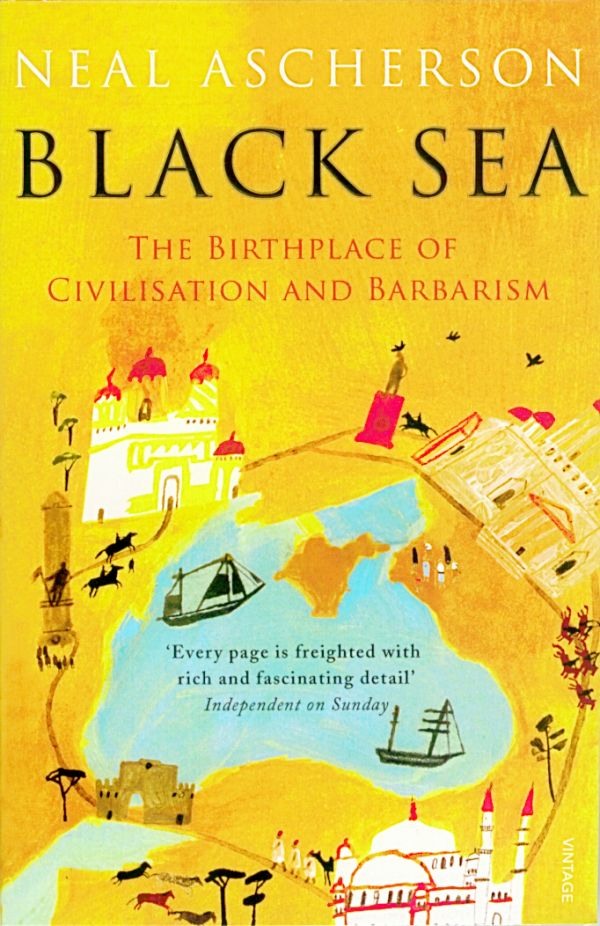Buy or gift a stand-alone digital subscription and get unlimited access to dozens of back issues for just £18.99 / $18.99 a year.
Please register at www.exacteditions.com/digital/cornucopia with your subscriber account number or contact subscriptions@cornucopia.net
Buy a digital subscription Go to the Digital Edition
The Birthplace of Civilization and Barbarism
This is a journalist’s collection of loosely knit essays about the Black Sea viewed from the northern shore, but with sadly little understanding of anything to the south, and no comprehension whatsoever of what historians might call the Ottoman centuries, and the extraordinarily intimate relationship between Istanbul and Crim Tartary, which makes it hugely disappointing for anyone interested in Turkey or Turkish culture, or even a larger picture of the Black Sea. For Asherson, the divide between north and south in the Black Sea makes the Atlantic a puddle by comparison. And his antipathy to Turks verges on the putrid. What did Nanny teach him? But the book is beautifully written all the same, deservedly a classic, with excellent accounts of Crimea, fish and Istanbul’s Poles. And the tragic story of the Tartars (who naturally are quite unrelated to Turks, which mercifully allows the author to pity them) is told unflinchingly. – John Scott
About one thousand miles long, Turkey’s Black Sea region stretches from the corner of the Caucasus to the hinterland of Istanbul. In it lives about twelve per cent of the country’s population: thrifty, hard-working and nowadays relatively prosperous people. Most of them are concentrated into ancient towns that began as seaports in classical times and straddle the feet of low but steep hills.
Today the eastern part of the coast road is more or less built up for hundreds of kilometres, westward from Rize and Trabzon as far as Giresun and Samsun, a ribbon of concrete that makes it much less pleasant to behold than it was in former times. But go a few miles inland and, because of the hills, communications are usually very poor; economic and social changes have arrived slowly.
The western half of the Black Sea, by contrast, has a still largely undeveloped coastline, at least from Sinop to Amasra. The wooded hills plunge down towards the sea with a hauntingly unspoilt beauty. If the Black Sea did not have such a short – and frankly very cool – summer season compared with the Turkish Mediterranean, it might have been a major tourist destination. As it is, visitors to the Black Sea have characteristically always been businessmen and traders. Even the region’s principal myth is about an economic wonder: the golden fleece.
After university, I lived for a year in a town with a fairly large and sophisticated middle class on the western Black Sea and I have revisited the region at fairly regular intervals ever since. These two books, both by professionally and intellectually distinguished British authors, made me feel distinctly uneasy about the gap between my perceptions of the region and theirs.
Neal Ascherson follows a technique favoured by many travel writers before him. He writes largely from a bookshelf stocked with classical and modern literature, history, art, archaeology, biography, even a dash of science. His real-time journeys around the Black Sea are a minor ingredient in an ever-bubbling broth of stories, ideas, legend – and comment. Anyone seeking an in-depth analysis of how the Black Sea countries are faring since the collapse of Communism should look elsewhere.
And although well over a third of the total Black Sea litoral must be Turkish, this section gets a less than proportionate share of attention. In Turkey, Ascherson is mainly interested in the Black Sea Greeks and the Laz. It is embarrassingly evident that he sees Turkey’s northern coast mainly as a formerly Greek area. Apart from Yaflar Kemal, who has nothing to do with the Black Sea, Turkish literature goes unmentioned, even the great folk poem of Dede Korkut, which, Ascherson would surely be pleased to learn, contains elements that can be traced back to The Odyssey.
He does not learn much from its inhabitants. A bearded man on a bus tells him, “I am a Turk”. Ascherson goes on a thirteen-hour overnight bus ride from Ankara to Trabzon and a crippled child dies at the back during the journey. Travelling at night means, of course, that he misses the land- and seascapes. There is only “an oppressive darkness at the side of the highway”.
Then, east of Trabzon, Ascherson run into groups speaking the languages of the Caucasus. He has already commented on how modern Turkey emerged out of the Ottoman Empire: “It imploded like a dead star, metamorphosing itself into a compact homogeneous modern state of Moslem religion and Turkish speech.”
Homogeneity is something Ascherson believes should be replaced by multiplicity, and he is enthusiastic about the efforts of a German linguist, Wolfgang Feuerstein, to fan into life a new culture, perhaps even a political movement, among the Laz, speakers of a non-Indo-European language close to Georgian.
The only problem is that the Laz themselves evidently do not want it. Overwhelmingly, they prefer to be Turks within Turkey…
1. STANDARD
Standard, untracked shipping is available worldwide. However, for high-value or heavy shipments outside the UK and Turkey, we strongly recommend option 2 or 3.
2. TRACKED SHIPPING
You can choose this option when ordering online.
3. EXPRESS SHIPPING
Contact subscriptions@cornucopia.net for a quote.
You can also order directly through subscriptions@cornucopia.net if you are worried about shipping times. We can issue a secure online invoice payable by debit or credit card for your order.

Cornucopia works in partnership with the digital publishing platform Exact Editions to offer individual and institutional subscribers unlimited access to a searchable archive of fascinating back issues and every newly published issue. The digital edition of Cornucopia is available cross-platform on web, iOS and Android and offers a comprehensive search function, allowing the title’s cultural content to be delved into at the touch of a button.
Digital Subscription: £18.99 / $18.99 (1 year)
Subscribe now